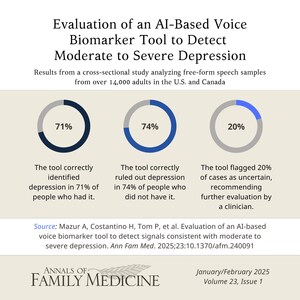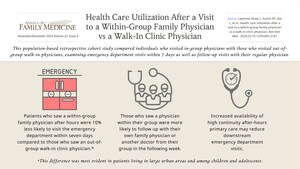PROVIDENCE, R.I., Nov. 28, 2023 /PRNewswire/ -- From the ability to conduct clinical visits online to utilizing artificial intelligence to effectively diagnose patients, technology has changed how all doctors practice medicine. One published paper in the November/December issue of Annals of Family Medicine explains how AI-driven technology presents new opportunities for more effective patient care while a second paper describes the interplay between fulfillment of basic psychological needs at work and technology use in maintaining clinician well-being.
In a six-month observational study and corresponding paper titled, "Home Monitoring of Asthma Exacerbations in Children and Adults using AI-Aided Stethoscope," researchers examined the use of artificial intelligence on 149 home-monitored asthma patients of various ages in Poland. They first identified the critical measurable symptoms of asthma exacerbation. They then queried to what extent an AI-aided home stethoscope could support detection of asthma exacerbations, especially in young children.
The researchers used standard certified medical devices to take measures of certain asthma symptoms (pulse oximeters for peripheral capillary oxygen saturation and peak flow meters for expiratory flow) in study participants over 5 years old.
For more subjective, auditory symptoms, a Conformité Européenne-certified StethoMe, an AI-based home stethoscope, recorded sounds from standard chest points of all study participants and transferred the sound files to a cell phone app. The recordings were automatically analyzed by an AI module and then generated results (pathological sound intensities, heart rate, respiratory rate, inspiration-to-expiration duration ratio), which were displayed in the app.
Physicians analyzed all data via an online platform to identify exacerbation occurrences. Ultimately, results suggest that while taking multiple measures is preferable, AI analysis of home stethoscope recordings alone can efficiently detect asthma exacerbation in patients of all ages, including children under 5 years old.
The researchers concluded that the StethoMe can be a useful tool for optimizing patient-doctor collaboration via telemedicine. For children under 5, the authors argue that it could significantly facilitate asthma monitoring by their parents and caregivers.
In a separate study, Canadian researchers examined how virtual care during the COVID-19 pandemic has impacted primary doctors' basic psychological needs and subjective well-being. Their paper is titled, "Family Physician Motivation and Well-Being in the Digital Era."
The team examined how autonomous (vs. controlled) motivation among family physicians impacted their subjective well-being when shifting to virtual care and whether satisfaction vs. frustration of their basic psychological needs for autonomy, competence, and relatedness, mediated that relationship. The researchers gathered qualitative data by surveying 156 family physicians in Alberta, Canada. The questionnaire measured motivational quality towards using virtual care, workplace psychological need fulfillment, and subjective well-being.
The authors found that primary care doctors who felt that they had little choice in using virtual care had lower well-being, and frustration of their workplace needs for autonomy, competence, and relatedness, fully mediated that relationship. Conversely, basic workplace psychological need satisfaction -- though not autonomous motivation towards using virtual care -- was associated with higher well-being.
The findings suggest that when family physicians' motivation towards using virtual care is less self-determined, it will lead to poorer subjective well-being because of basic psychological need frustration.
Articles cited:
Home Monitoring of Asthma Exacerbations in Children and Adults Using AI-aided Stethoscope. Kamil Janeczek, Andrzej Emeryk, Eric Derom, Barbara Kuźnar-Kamińska, Anna Zelent, Mateusz Łukaszyk, Tomasz Grzywalski, Anna Pastusiak, Adam Biniakowski, Krzysztof Szarzyński, Dick Botteldooren, Jędrzej Kociński, Honotara Hafke-Dys
Family Physician Motivation and Well-Being in the Digital Era. Adam Neufeld, Oksana Babenko, Vishal Bhella
SOURCE Annals of Family Medicine

WANT YOUR COMPANY'S NEWS FEATURED ON PRNEWSWIRE.COM?
Newsrooms &
Influencers
Digital Media
Outlets
Journalists
Opted In






Share this article